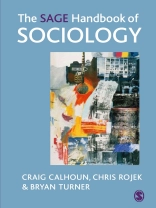Sociology has evolved greatly since it′s inception as an academic discipline. It has diverged into numerous strands often flowing in disparate directions – so much so that today the notion of canonical sociology has become widely disputed. The field of sociology at present approximates to one of multi-paradigmatic complexity in which many approaches to theory must be distinguished and situated. In addition, the discipline has had to confront new challenges from globalization, the shift of interest from production to consumption, the rise of new social movements, the challenge of bio-engineering, the collapse of a ′presently existing socialist alternative′ and much else besides.
The new SAGE Handbook of Sociology aims to address these new developments, while at the same time providing an authoritative guide to theory and method, the key sub-disciplines and the primary debates of today. To undertake this ambitious project three leading figures in the field of sociology were selected as editors to bring together the foremost exponents of the different strands that contribute towards the make up modern sociology. Drawn from both sides of the Atlantic the contributors have been commissioned to utilise the most up to date research available to provide a critical, international analysis of their area of expertise.
The result is this essential resource collection that not just reflects upon the condition of sociology today but also looks to future developments in the discipline. The Handbook is invaluable not just all sociologists but to a wide variety of students and researchers across the social sciences.
Click on ′Sample Chapters & Resources′ to download the introduction.
विषयसूची
Introduction – Craig Calhoun, Chris Rojek and Bryan Turner
PART ONE: THEORY AND METHOD
Quantitative Research Methods – Adrian E Raftery
Qualitative Research Traditions – Paul Atkinson and Sara Delamont
Sociology and Philosophy – Randall Collins
The Diversity and Insularity of Sociological Traditions – Charles Crothers
Comparative Sociology – David A Apter
Some Paradigms and their Moments
PART TWO: THE AXIAL PROCESSES OF SOCIETY
The Culture of Work – Richard Sennett
The Sociology of the Family – Bryan Turner
The Social Institution of Money – Geoffrey Ingham
The Sociology of Consumption and Lifestyle – Don Slater
The Sociology of Mediation and Communication – Roger Silverstone
An Entirely Different World? Challenges for the Sociology of Race and Ethnicity – Patricia Hill Collins
A Sociology of Information – David Lyon
Class and Stratification – Mike Savage
Current Problems and Revivial Prospects
The Sociology of Culture – Wendy Griswold
The Sociology of Health and Illness – Gary L Albrecht
The Sociology of Religion – Bryan Turner
Leisure and Tourism – Chris Rojek
The Sociology of the Environment and Nature – Steven Yearley
Poverty and Life Chances – Dalton Conley
The Conceptualization and Study of the Poor
Globalization – Roland Robertson and Kathleen E White
Sociology and Cross-Disciplinarily
The Sociology of Gender – Sylvia Walby
Historical Trends and Future Prospects – Charles Hirschman Population and Society
PART THREE: PRIMARY DEBATES
A New Approach for Theoretically Integrating Micro and Macro Analysis – Jonathan H Turner
Global Inequality – Jan Nederveen Pieterse
Bringing Politics Back In
Sociology and the Body – Nick Crossley
The City – Saskia Sassen
Its Return as a Lens for Social Theory
Sociology of Deviance – Heinz Steinert
The Disciplines of Social Exclusion
Globalizing Business – Stewart R Clegg
Sex and Power – Elspeth Probyn
Capillaries, Capabilities and Capacities
The Sociology of the University and Higher Education – Gerard Delanty
The Consequences of Globalization
Science, Technology and their Implications – Karin Knorr Cettina
Citizenship, Ethnicity and Nation-States – Sinisa Malesevic and John A Hall
लेखक के बारे में
Bryan S. Turner is Professor of Sociology in the Asian Research Institute (ARI) at the National University of Singapore. Previously he was Professor of Sociology in the Faculty of Social and Political Sciences at the University of Cambridge from 1998-2005. His research interests include globalization and religion, concentrating on such issues as religious conflict and the modern state, religious authority and electronic information, religious, consumerism and youth cultures, human rights and religion, the human body, medical change, and religious cosmologies. He is Joint Chief Editor of the journal Citizenship Studies and serves on the editorial boards of several prestigious journals.












